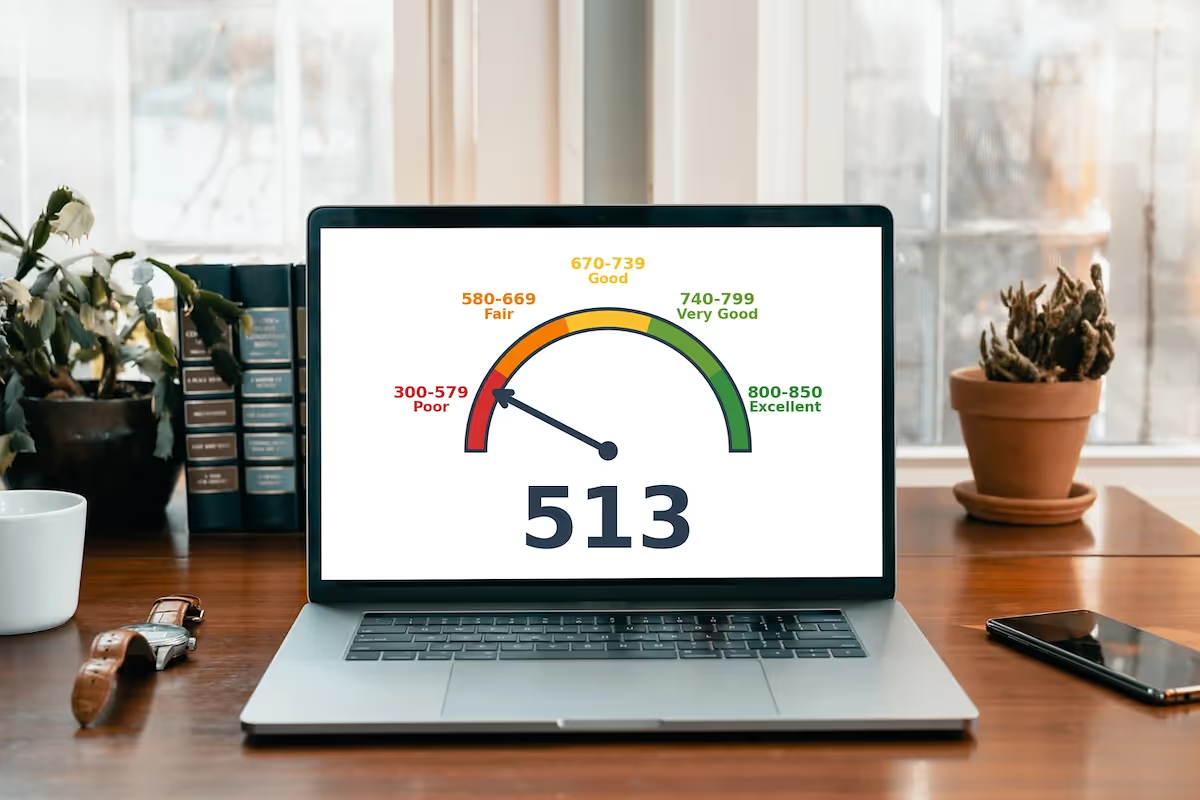
Kudos has partnered with CardRatings and Red Ventures for our coverage of credit card products. Kudos, CardRatings, and Red Ventures may receive a commission from card issuers. Kudos may receive commission from card issuers. Some of the card offers that appear on Kudos are from advertisers and may impact how and where card products appear on the site. Kudos tries to include as many card companies and offers as we are aware of, including offers from issuers that don't pay us, but we may not cover all card companies or all available card offers. You don't have to use our links, but we're grateful when you do!
513 Credit score: What You Need to Know in 2025
July 1, 2025


TL;DR
A 513 credit score presents a significant opportunity for improvement as you build your financial profile. This score is classified within the 'Poor' FICO score range, signaling a clear path forward for strengthening your credit.
What Does a 513 Credit Score Mean?
A FICO score of 513 places you in the "poor" credit range, which spans from 300 to 579. Lenders view this as a sign of high risk, creating hurdles when you apply for new credit. You may find it difficult to get approved for loans or credit cards, and any approvals will likely come with unfavorable terms. This often means higher interest rates, making borrowing significantly more expensive.
While a 513 score presents challenges, it's not a permanent financial sentence. Consider it a starting point from which you can build a stronger credit history. Understanding where you stand is the first step toward improving your financial future. With consistent effort, moving toward a healthier score is an achievable goal that can unlock better opportunities down the road.
Who Has a 513 Credit Score?
While age is not a direct factor in credit score calculations, there is a clear trend of scores improving over time. The average credit scores by generational age group for 2023 show a steady increase, putting a 513 score well below the average for even the youngest adults:
- Generation Z (ages 18-26): 680
- Millennials (ages 27-42): 690
- Generation X (ages 43-58): 709
- Baby Boomers (ages 59-77): 745
- Silent Generation (ages 78+): 760
Credit Cards With a 513 Credit Score
A credit score of 513 falls into the "poor" range, which can significantly limit your options when applying for a new credit card. Most lenders view this score as an indicator of high risk, making it challenging to get approved for traditional, unsecured credit cards. Consequently, you'll likely find your choices are restricted to secured cards or specific unsecured cards designed for individuals with bad credit, which often come with higher interest rates and lower credit limits.
Kudos can help you find the right card for your situation with its Explore Tool, which uses a quiz to understand your preferences and match you with options from a database of nearly 3,000 cards. The platform also provides insights into how applying for a new card could impact your credit score, allowing you to make an informed decision that aligns with your financial goals.
Auto Loans and a 513 Credit Score
A 513 credit score places you in the subprime category, which can make securing an auto loan more challenging. Lenders view this score as high-risk, meaning you will likely face significantly higher interest rates, as shown in the rate breakdown below.
- Super-prime (781-850): 5.25% for new cars and 7.13% for used cars
- Prime (661-780): 6.87% for new cars and 9.36% for used cars
- Non-prime (601-660): 9.83% for new cars and 13.92% for used cars
- Subprime (501-600): 13.18% for new cars and 18.86% for used cars
- Deep subprime (300-500): 15.77% for new cars and 21.55% for used cars
Mortgages at a 513 Credit Score
Securing a mortgage with a 513 credit score is challenging, but you have options. Your most viable path is likely an FHA-insured loan, which requires a 10% down payment for scores under 580. Some specialty non-prime lenders might also consider your application, but conventional loans are generally out of reach.
A 513 score directly impacts your loan terms. Expect significantly higher interest rates, increasing the total cost of your home over time. In addition to the larger down payment, FHA loans will include pricier mortgage insurance premiums. Lenders may also cap your borrowing amount and require a more stringent manual underwriting process to approve your loan.
What's in a Credit Score?
Understanding your credit score can feel like trying to solve a complex puzzle, as it's a blend of several key financial habits. The most common factors that determine your score include:
- Your payment history tracks whether you have paid past credit accounts on time.
- Credit utilization is the percentage of your available credit that you are currently using.
- The length of your credit history considers the age of your oldest account and the average age of all your accounts.
- Credit mix refers to the variety of credit products you have, such as credit cards, retail accounts, and loans.
- New credit inquiries and recently opened accounts can also temporarily impact your score.
How to Improve Your 513 Credit Score
Having a 513 credit score can feel limiting, but improving your score is always possible with time and consistent effort. Whether you're aiming for a FICO® Score or VantageScore, there are proven methods to boost your creditworthiness.
- Monitor Your Credit Reports. Regularly check your free credit reports for inaccuracies or signs of identity theft that could be dragging your score down. Disputing errors is one of the fastest ways to see a potential score increase, as it removes negative information you aren't responsible for.
- Establish Automatic Bill Payments. Since payment history is the single biggest factor in your credit score, setting up automatic payments ensures you never miss a due date. Consistently paying bills on time is the most critical step to rebuilding your credit profile from a 513 score.
- Reduce Your Credit Utilization. Aim to keep your credit card balances below 30% of your total credit limit, as high utilization severely hurts your score. Paying down balances demonstrates responsible credit management to lenders and can provide a significant boost to your score.
- Apply for a Secured Credit Card. A secured card requires a cash deposit but is an excellent tool for someone with a 513 score to build or rebuild credit. Making timely payments on a secured card gets reported to the major credit bureaus, establishing a positive payment history that will improve your score over time.
As you work on these habits, using a tool like Kudos can help you make smarter spending decisions and optimize your credit card usage.
Unlock your extra benefits when you become a Kudos member

Turn your online shopping into even more rewards

Join over 400,000 members simplifying their finances

Editorial Disclosure: Opinions expressed here are those of Kudos alone, not those of any bank, credit card issuer, hotel, airline, or other entity. This content has not been reviewed, approved or otherwise endorsed by any of the entities included within the post.



































.webp)

.webp)
.webp)





